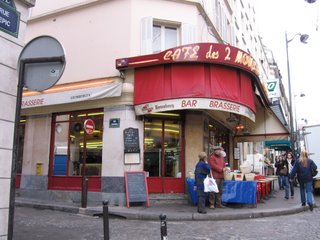
I’m not sure why we picked Amélie, but aside from a few moments of discomfort – the kind that stems naturally from being 16 and hearing the word “orgasm” while sitting next to a friend’s father who also happens to be a pastor, we loved it.
I’m not sure I know anyone who has seen the movie and didn’t enjoy it, actually. We loved it because we were 15 and it painted such a magical picture of Paris. Freshman year living in the dorms at UW we had an “Amélie Night” in the third floor lounge to share the movie with those hapless Honors students who had somehow escaped falling in love with Amélie thus far.
It’ll always be one of my favorite movies, but these days the name Amélie Poulain carries a bit more weight for me. Tacomans and Seattlites watched it for Paris and its mystery and romanticism. Parisians watched it because it was their movie. Audrey Tatou is their sweetheart, and being set in the heart of Montmartre – filmed in cafés and markets that really exist, Amélie was born in the heart of Paris.
Café les deux moulins:

In the six years since the world became privy to the Fabuleux destin d’Amélie Poulain, Audrey Tatou’s Amélie has become something of a Parisian symbol. C’est la Paris d’Amélie, it’s Amélie’s Paris, has become something of a catch phrase, inducted into life by students, professors, journalists and all other denizens of Paris. The funny thing about this categorization, is its connotation – which depends completely on the context and the person saying it.
Montmartre is rather idyllic:

If you hear someone refer to Amélie’s Paris, it’s just about as likely to be pejorative as it is affectionate. If you’ve seen the movie Amélie, it’s going to be easy to conjure up an imaginative mental picture of Paris – a bright and lively world, where the streets are clean, Parisians know the names of their grocers and waitresses. It's a place where you’re not going to catch a crippling disease sleeping in a metro station, where a goldfish “liberated” into a river is going to survive the pollutants for longer than a few days, where love is waiting to sweep you off on the back of his scooter.
Amélie's Paris:

It’s a nice place to imagine – it really is, and in some ways it does exist. In a way, Amélie’s Paris is the heart of this city – a chic, colorful, comfortable, fascinating, magical endroit. A place where there’s possibility in every day – and, as trite as this expression has become, you never know where the day will lead you. In that sense, the Paris of Amélie Poulain is quintessential Paris, a fabulous girl that holds a special place in the heart of the most cynical of Parisians.
What can’t be forgotten is that while Amélie’s Paris really is that endearing magical place for some people (i.e. bobo (yuppies who don't want to believe they are yuppies) to affluent exchange students here on a ticket from an elite institution of political science), it is the absolute contrary for so many who live here. An article we read about immigration and discrimination in France for one of my classes during the stage d’integration defined Amélie’s Paris as a Paris with ni noir, ni arabe (basically a white Paris without blacks and Arabs). The sole Arab in the film, Lucien is a handicapped employee of the grocer, played by a Moroccan beur actor (a beur is a second-generation North African – the term used to be derogatory, but it’s lost its original meaning in becoming part of mainstream speech) who was born in Paris.
Lucien was an intentional placement by the director as a symbol of the Arab in France, but his solitary presence still adds weight to the implications of Amélie’s Paris. For those who have a lesser affection for the Paris of Amélie Poulain, it is more a symbol of everything that is wrong with the country than everything that is essential to Paris.
Real Paris:

The film shows nothing of the banlieues, the tent cities that line the Canal Saint-Denis, the street protests and the problems facing the countries immigrants and minorities. There are many who feel that the country is run by a stuffy elite, all formed from the same mold who often fall into the trap of thinking that Paris is a true representation of France. There’s a pretty widespread sentiment that that very quintessential Paris inhabited by Amélie represents this stale situation and everything that desperately needs to be changed. To this end, to live in Amélie’s Paris is to be idealistic and naïve, to sweep the country’s problems under the rug – no matter how attractive and whimsical that rug may be.
For me, an outsider just listening and observing, I love living in the marvelous Paris of Amélie Poulain. I love walking through Montmartre in a skirt, buying baguettes at my local boulangerie, going to the open-air Saturday market, making eyes at cute boys on Vespas – all to the soundtrack of old-school Parisian street-corner accordian music that plays in my head.
This is fun and lovely while it lasts, this strolling and thinking how much I love living in this most magical of cities. But then I take a turn up Quai de Valmy, and spend 20 minutes walking by tent after tent after tarp after tent, spray-painted with messages like, Je vis sans toi (I live without any help from you) and a sloppily-scrawled survivant (survivor) across a small red tent close to collapsing under the wind. This is all it takes to jerk me back to that other Parisian reality – the one that exists in a combination of Amélie’s magic and all of the problems that are unceasingly present.
Real Paris:























